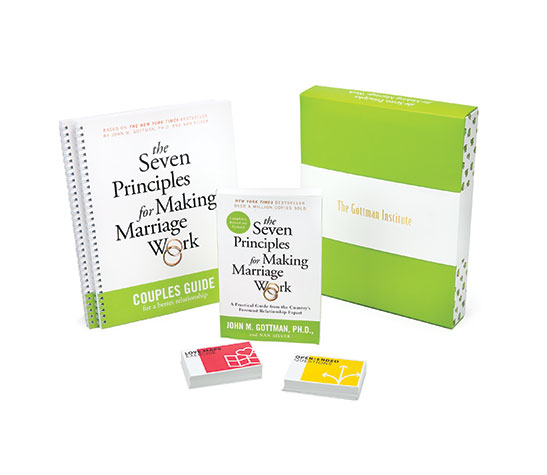All couples argue. This is a fact supported by decades of research. As a same-sex couple, however, we are faced with unique cultural and social stressors which can result in external tensions spilling over into our marriage. We’ve learned to become masters of repair attempts, employing them early and often to resolve our disputes before they escalate.
With that said, early in our marriage we realized that not all repair attempts were effective, and that the success of a repair attempt often had to do with how well it was tailored to the other person.
What is a repair attempt?
A repair attempt is any statement or action — verbal, physical, or otherwise — meant to diffuse negativity and keep a conflict from escalating out of control. In his book The Seven Principles for Making Marriage Work, John Gottman, Ph.D., calls repair attempts a secret weapon of emotionally intelligent couples. His groundbreaking research shows “the success or failure of a couple’s repair attempts is one of the primary factors in whether [a] marriage is likely to flourish or flounder.”
But what do we do when our repair attempts fall flat?
For example, our household’s neverending, who-cleans-the-dishes dispute rarely gets repaired well. This is because David grew up in a family where plates were always cleaned promptly after use, and leaving dirty dishes overnight was as abominable as leaving the toilet unflushed. Constantino grew up with a more laissez-faire attitude toward dishes, letting them exist in the sink in until they get in the way.
The ongoing tension over dishes results in small, frequent blowups on David’s end, and leaves Constantino struggling to make repair attempts, some of which fail horribly.
Sometimes Constantino attempts to repair with physical touch, by hugging or kissing David. Constantino interprets touch as a way to express affection in the midst of conflict.
While David appreciates touch in general, when he is physiologically flooded, his walls go up and to him touch feels like an act of aggression – even though he is aware that Constantino’s touch is a repair attempt.
Making repair attempts isn’t enough
One lesson Constantino has learned over time is that David responds well to humor, in part because David knows he is uptight about insignificant things like dishes. So when the dish argument rears its ugly head, rather than trying to hug David, Constantino has taken to humoring him. He often does a little dance where he points at David, and in a funny voice starts calling him by his pet name (which we needn’t mention here). The result invariably makes David laugh, and the conflict is de-escalated even if the perpetual problem isn’t resolved. And in this instance at least, Constantino also addresses David’s primary concern. He rolls up his sleeves and does the dishes.
What our marriage has taught us is that the simple act of making repair attempts isn’t enough. Knowing your spouse by understanding their needs, especially in the context of conflict, will help you devise ways to more effectively de-escalate an argument.
Know how your partner receives love
Maybe your spouse responds well to gifts, and so during a cool-down period after a fight you go buy her a flower or her favorite coffee drink from Starbucks. Maybe your spouse craves affirmation, and so during a fight you seek to reassure him how much you love him, even when you’re angry about something he did.
Knowing how your partner receives love and what they need to repair from conflict is like having a secret weapon tailored just to them and their happiness.
Of course, simply making a good repair attempt doesn’t ensure success. It’s also incumbent upon the other spouse to recognize and accept the attempt. And if only one person in a marriage is habitually making the effort to resolve the conflict, the imbalance may take its toll over time. Both spouses need to do the work toward dissolving negativity and, when possible, resolving conflict.
For David’s part, he knows that in the midst of conflict, Constantino will feel comforted with physical touch – a comforting hand on his knee or a gentle arm around him. Sometimes there might even be a shoulder rub involved. David knows Constantino loves quality time, so any productive dispute will involve a conversation when both partners are physically present The magic is that once one partner makes a repair attempt, the other person feels better and usually responds in kind.
We may never resolve our dish dispute, but we’re developing effective tools to mitigate the conflict and get past it as quickly as possible so we can get back to staying connected. These efforts don’t always come natural to us, but we’re learning that a significant part of love is simply making the effort to repair, maintain, and grow the relationship. Love might be work, but it helps to remember that the more work we do, the more we deepen our love for each other.








